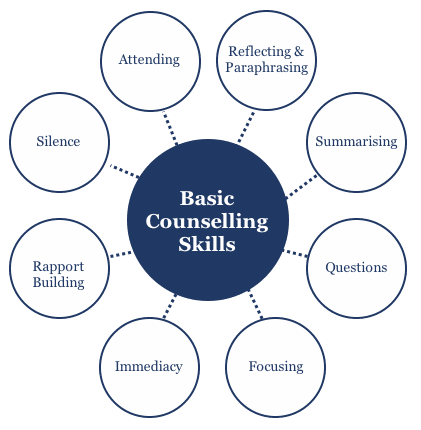
Counsellors use counselling skills to help them better understand and listen to clients. Through active listening, rapport is built, trust forms and the speaker feels heard and understood by the counsellor or listener. ,

The core counselling skills are described below.
Attending in counselling means being in the company of someone else and giving that person your full attention, to what they are saying or doing, valuing them as worthy individuals.
Silence in counselling gives the client control of the content, pace and objectives.
This includes the counsellor listening to silences as well as words, sitting with them and recognising that the silences may facilitate the counselling process.
Reflecting in counselling is part of the ‘art of listening’. It is making sure that the client knows their story is being listened to.
This is achieved by the helper/counsellor by both repeating and feeding a shorter version of their story back to the client. This known as 'paraphrasing'.
Questions in counselling are classed as a basic skill. The counsellor uses open questions to clarify his or her understanding of what the client is feeling.
Leading questions are to be avoided as they can impair the counselling relationship.
Focusing in counselling involves making decisions about what issues the client wants to deal with.
The client may have mentioned a range of issues and problems and focusing allows the counsellor and client together to clear away some of the less important surrounding material and concentrate on the central issues of concern.
Building rapport with clients in counselling is important, whatever model of counselling the counsellor is working with.
Rapport means a sense of having a connection with the person.
Summaries in counselling are longer paraphrases. They condense or crystallise the essence of what the client is saying and feeling.
The summary 'sums up' the main themes that are emerging.
Using immediacy means that the therapist reveals how they themselves are feeling in response to the client.
According to Feltham and Dryden (1993: 88), immediacy is ‘the key skill of focusing attention on the here and now relationship of counsellor and client with helpful timing, in order to challenge defensiveness and/or heighten awareness’.
Examples of Counselling Skills
If you don't understand, it's OK to check and ask for further information.
The speaker should do most of the talking.
To avoid sounding like a parrot, it's better to use your own words when summarising or paraphrasing.
This may indicate that the speaker is unacceptable or odd.
This is quite an interesting topic.
Counselling skills are really ‘the art of listening’ and are practised by any number of people in any number of work roles, not just in counselling.
However, the art of listening can be practised by almost anybody.
Click the picture to download the Key Counselling Skills Explained handout
Here are a few ideas:
On a recent visit to my hairdresser, a woman customer sat next to me. She was telling her stylist the difficulties she was having in her relationship.
The stylist listened patiently, did not judge or offer advice and seemed to understand her difficulty and paid attention. Clearly, the hair stylist had mastered ‘the art of listening’.
On a train journey the Edinburgh, I sat and listened to two strangers opposite me having a conversation.
The listener showed a non-judgmental attitude, was patient and only asked questions to clarify their understanding.
Consequently, the second passenger spoke about a lot of personal issues to a stranger on a train because the first passenger knew ‘the art of listening’.
We live in a society where we are consistently ‘talked at’.
Let me ask you this question:
Who do you prefer to be with? Someone who talks to you or someone who listens to you?
Have a think of any other work roles that require counselling skills.